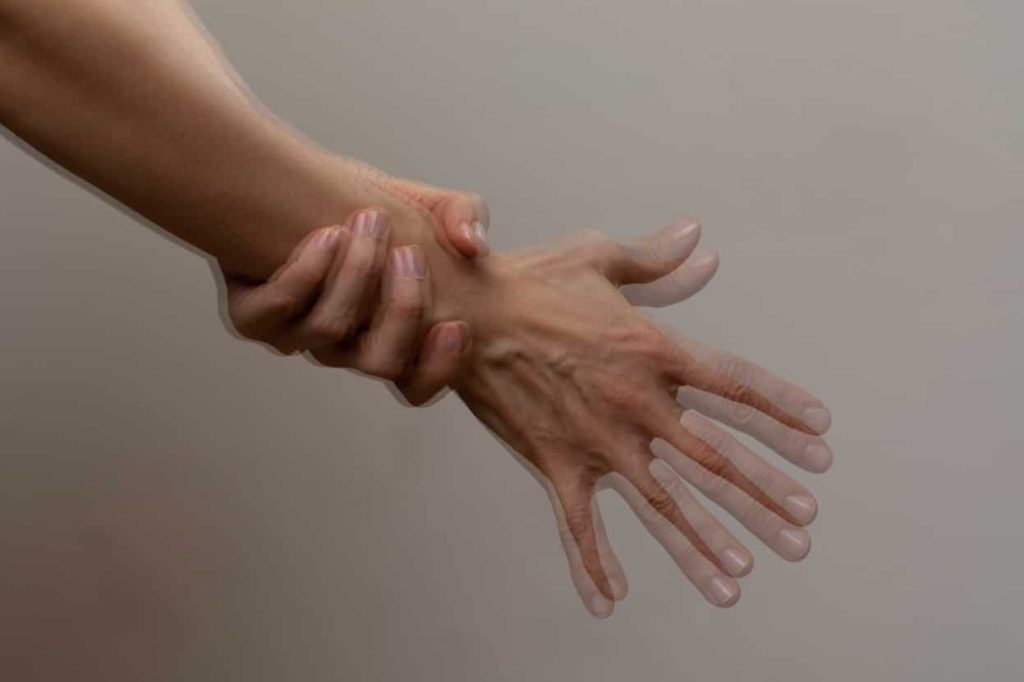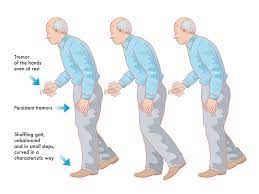Tremor is the involuntary movement and shaking of the body. This condition is most commonly seen in the hands, arms, head, and vocal cords, but can be felt in any body area. Tremor is the most common type of movement disorder and can affect quality of life. Essential tremor is the most common form of tremor and is usually familial. In this article we have written for you, we will try to give information about the causes, types and symptoms of tremor.
- What Causes Tremor?
- What Are The Types Of Tremor?
- What Is Essential Tremor?
- What Is Parkinsonian Tremor?
- What Is Dystonic Tremor?
- What Is Cerebellar Tremor?
- What Is Psychogenic Tremor?
- Who Is More Likely to Get Tremor?
- What Are The Latest Updates on Tremor?
- What Are the Risk Factors of Tremor?
- What Are the Complications of Tremor?
- What Are The Symptoms of Tremor (Shakes, Essential Tremor)?
- How Is Tremor Diagnosed?
- What Are Tremor Treatment Methods?
- Tremo Treatment Prices In Turkey

What Causes Tremor?
Although the exact cause of tremor is unknown, genetic factors and certain dysfunctions in the brain are thought to play a role. Essential tremor is more common in people with a family history and usually begins in middle age. In addition, stress, fatigue, caffeine consumption and the use of certain medications can increase the severity of tremor. Conditions such as neurological diseases, thyroid problems, and alcohol abuse can also cause tremor to occur.
What Are The Types Of Tremor?
Tremors are involuntary, rhythmic movements of one or more parts of the body, often occurring in the hands, arms, head, face, vocal cords, trunk, or legs. While tremors are commonly associated with neurological conditions such as Parkinson’s disease, they can manifest in various forms, each with its own distinct characteristics and underlying causes. In this article, we’ll delve into the different types of tremors, shedding light on their symptoms, causes, and management strategies.
- Essential Tremor: Essential tremor is the most common type of tremor, affecting millions of people worldwide. It typically manifests as a rhythmic shaking of the hands, although it can also affect the head, voice, or other parts of the body. Essential tremor usually occurs during voluntary movements and can worsen with stress, caffeine consumption, or fatigue. While the exact cause is unknown, genetic factors are believed to play a significant role in its development.
- Parkinsonian Tremor: Parkinsonian tremor is one of the hallmark symptoms of Parkinson’s disease, a progressive neurological disorder. Unlike essential tremor, which occurs primarily during movement, Parkinsonian tremor often manifests at rest and diminishes with purposeful activity. It typically involves a rhythmic shaking of the hands, fingers, or thumbs, known as a “pill-rolling” tremor due to its characteristic motion resembling the rolling of a pill between the fingers. Parkinsonian tremor results from the degeneration of dopamine-producing neurons in the brain.
- Dystonic Tremor: Dystonic tremor is associated with dystonia, a movement disorder characterized by involuntary muscle contractions, which can cause twisting, repetitive movements, or abnormal postures. Dystonic tremor often occurs in conjunction with dystonia-related movements and may affect various parts of the body, including the neck, voice, or limbs. It can be exacerbated by specific actions or positions and tends to be more irregular than other types of tremors.
- Cerebellar Tremor: Cerebellar tremor arises from dysfunction or damage to the cerebellum, a region of the brain responsible for coordinating voluntary movements and maintaining balance. This type of tremor is characterized by a broad, low-frequency oscillation, often affecting the arms, legs, or trunk. Cerebellar tremor may occur with other symptoms such as ataxia (loss of coordination), and its severity can fluctuate depending on the underlying cause, which may include stroke, multiple sclerosis, or tumor.
- Psychogenic Tremor: A psychogenic tremor is a tremor that is thought to have psychological or emotional origins rather than a neurological cause. It may resemble other types of tremors but often exhibits variable patterns and inconsistent features. Psychogenic tremor can be triggered or exacerbated by stress, anxiety, or attention, and it may occur in the absence of neurological abnormalities on examination. Diagnosis can be challenging and typically involves ruling out other potential causes through thorough evaluation.
Conclusion:
Understanding the various types of tremors is essential for accurate diagnosis and appropriate management. While some tremors, such as essential tremor and Parkinsonian tremor, have well-defined characteristics and treatment approaches, others may pose diagnostic challenges due to their diverse presentations and underlying causes. By identifying the type of tremor and addressing its specific underlying factors, healthcare professionals can tailor treatment strategies to help improve quality of life for individuals affected by these involuntary movements.

What Is Essential Tremor?
Essential tremor is a neurological disorder characterized by involuntary shaking or trembling of certain parts of the body, most commonly the hands, arms, head, or voice. While essential tremor is often mistaken for Parkinson’s disease due to similar symptoms, it is a distinct condition with its own set of characteristics and challenges. In this article, we’ll delve into the intricacies of essential tremor, exploring its causes, symptoms, diagnosis, and available treatment options.
What Causes Essential Tremor? The exact cause of essential tremor remains unclear, although researchers believe it involves abnormalities in certain areas of the brain that control movement. Genetic factors also play a significant role, as essential tremor often runs in families and may be inherited through an autosomal dominant pattern. While the specific genes associated with essential tremor are still being investigated, variations in genes related to neurotransmitter pathways and brain function are thought to contribute to its development.
Symptoms of Essential Tremor: Essential tremor typically presents as rhythmic shaking or trembling, which may worsen during voluntary movements or activities such as holding objects, writing, or pouring liquids. The intensity of the tremor can vary from mild to severe and may progress over time, affecting daily tasks and activities. Common symptoms of essential tremor include:
- Trembling hands: A noticeable shaking of the hands, particularly when performing tasks that require fine motor skills.
- Tremor in other body parts: Essential tremor can also affect the arms, head, voice, or other parts of the body, although hand tremors are most common.
- Worsening with movement: The tremor may become more pronounced during voluntary movements or when under stress.
- Improvement with rest: Unlike Parkinson’s disease tremors, essential tremor tends to improve when the affected limb is at rest and may be less noticeable during sleep.
Diagnosis and Evaluation: Diagnosing essential tremor involves a thorough medical history, physical examination, and assessment of symptoms. Your healthcare provider may also perform additional tests, such as neurological exams, blood tests, or imaging studies, to rule out other potential causes of tremor, such as Parkinson’s disease, thyroid disorders, or medication side effects. Essential tremor is often diagnosed based on clinical findings and the absence of other underlying conditions.
Treatment Options: While there is no cure for essential tremor, several treatment options are available to help manage symptoms and improve quality of life:
- Medications: Certain medications, such as beta-blockers (e.g., propranolol) and anti-seizure drugs (e.g., primidone), can help reduce tremor severity in some individuals.
- Botox injections: Injections of botulinum toxin (Botox) may be used to target specific muscles affected by tremor, particularly in cases of head or vocal tremor.
- Deep brain stimulation (DBS): For individuals with severe essential tremor that does not respond to medication, DBS surgery may be considered. DBS involves implanting electrodes in specific areas of the brain to modulate abnormal neural activity and reduce tremor.
- Lifestyle modifications: Managing stress, getting adequate rest, avoiding caffeine and stimulants, and practicing relaxation techniques may help minimize tremor symptoms.
Conclusion: Essential tremor is a chronic neurological condition that can significantly impact daily functioning and quality of life. While it is often mistaken for Parkinson’s disease, essential tremor has its own distinct features and treatment approaches. By understanding the causes, symptoms, and available management options for essential tremor, individuals affected by this condition can work with healthcare professionals to develop personalized treatment plans tailored to their needs.

What Is Parkinsonian Tremor?
Parkinsonian tremor is a distinct type of tremor that is closely associated with Parkinson’s disease, a progressive neurological disorder affecting millions worldwide. This characteristic shaking or trembling can significantly impact daily life, but understanding its nature, causes, and available treatments is essential for managing the condition effectively. In this article, we’ll delve into the specifics of Parkinsonian tremor, providing insights into its symptoms, underlying causes, and potential treatment avenues.
Symptoms of Parkinsonian Tremor: Parkinsonian tremor typically manifests as a rhythmic shaking or trembling, primarily affecting the hands, fingers, thumbs, or occasionally other parts of the body like the legs or chin. Unlike tremors associated with essential tremor, which often worsen with voluntary movement, Parkinsonian tremor tends to emerge when the affected limb is at rest and diminishes with purposeful activity. This tremor may appear as a “pill-rolling” motion of the fingers or a back-and-forth movement of the hands.
Causes and Mechanisms: The root cause of Parkinsonian tremor lies in the degeneration of dopamine-producing neurons within a region of the brain called the substantia nigra. Dopamine is a crucial neurotransmitter involved in regulating movement, and its depletion leads to disrupted neural signaling and impaired motor control, resulting in tremor and other hallmark symptoms of Parkinson’s disease. While the exact triggers for this neurodegenerative process are not fully understood, genetic predisposition, environmental factors, and aging are believed to play significant roles.
Diagnosis and Evaluation: Diagnosing Parkinsonian tremor involves a comprehensive assessment by a healthcare professional, including a detailed medical history, neurological examination, and evaluation of symptoms. Additional tests such as MRI scans may be conducted to rule out other potential causes of tremor and confirm the presence of underlying neurodegenerative changes associated with Parkinson’s disease. Early diagnosis is crucial for initiating appropriate treatment and support strategies to manage the condition effectively.
Treatment Options: While Parkinsonian tremor is not curable, various treatment approaches can help alleviate symptoms and improve quality of life for individuals affected by Parkinson’s disease:
- Medications: Dopaminergic medications, such as levodopa and dopamine agonists, are commonly prescribed to replenish dopamine levels in the brain and mitigate motor symptoms, including tremor.
- Deep Brain Stimulation (DBS): DBS surgery involves implanting electrodes in specific brain regions to modulate abnormal neural activity and alleviate tremor, particularly in cases of medication-resistant symptoms or motor fluctuations.
- Physical Therapy: Physical therapy, occupational therapy, and speech therapy can help individuals with Parkinsonian tremor enhance mobility, coordination, and speech clarity, fostering greater independence and functional abilities.
Conclusion: Parkinsonian tremor is a distinctive feature of Parkinson’s disease, reflecting underlying disruptions in dopamine-mediated neural circuits responsible for motor control. While living with Parkinson’s disease and its associated tremor can present challenges, advances in treatment options offer hope for improved symptom management and enhanced quality of life. By raising awareness and understanding Parkinsonian tremor’s symptoms, causes, and available interventions, individuals, caregivers, and healthcare professionals can collaborate to optimize care and support for those affected by this condition.
What Is Dystonic Tremor?
Dystonic tremor is a distinct type of tremor that arises from dystonia, a movement disorder characterized by involuntary muscle contractions. While dystonic tremor shares similarities with other types of tremors, such as essential tremor and Parkinsonian tremor, its underlying mechanisms and clinical features set it apart. In this article, we’ll unravel the complexities of dystonic tremor, shedding light on its symptoms, causes, and available treatment options.
Understanding Dystonic Tremor: Dystonic tremor manifests as involuntary rhythmic movements that occur in conjunction with dystonia-related muscle contractions. Unlike essential tremor, which primarily affects voluntary movements, dystonic tremor often emerges during specific actions or postures and may exhibit irregular patterns or variations in intensity. This tremor can affect various parts of the body, including the neck, voice, or limbs, and is typically associated with dystonia-related movements or postures.
Causes and Mechanisms: The precise cause of dystonic tremor remains unclear, but it is believed to stem from abnormal neuronal activity within the basal ganglia and other brain regions involved in motor control. Dystonia is thought to result from a combination of genetic predisposition, environmental factors, and disruptions in neurotransmitter signaling, particularly involving dopamine and gamma-aminobutyric acid (GABA). Dystonic tremor may occur in isolation or alongside other forms of dystonia, such as focal dystonia or generalized dystonia.
Symptoms and Diagnosis: Dystonic tremor presents as a characteristic shaking or trembling that accompanies dystonic movements or postures. Symptoms may vary in severity and frequency, with some individuals experiencing intermittent tremor episodes while others may have continuous tremor activity. Diagnosis of dystonic tremor involves a comprehensive evaluation by a healthcare professional, including a thorough medical history, neurological examination, and assessment of dystonia-related symptoms. Additional tests, such as electromyography (EMG) or imaging studies, may be used to confirm the diagnosis and rule out other potential causes of tremor.
Treatment Options: While dystonic tremor is not curable, several treatment strategies can help manage symptoms and improve quality of life for individuals affected by dystonia:
- Medications: Anticholinergic medications, such as trihexyphenidyl or benzodiazepines, may be prescribed to alleviate dystonia-related symptoms, including tremor. Botulinum toxin injections can also target specific muscles affected by dystonic tremor, providing localized relief.
- Deep Brain Stimulation (DBS): DBS surgery involves implanting electrodes in targeted brain regions to modulate abnormal neural activity and reduce tremor severity. DBS is often considered for individuals with severe or medication-resistant dystonic tremor who have not responded adequately to other treatment options.
- Physical Therapy: Physical therapy, occupational therapy, and speech therapy can help individuals with dystonic tremor improve muscle control, coordination, and functional abilities, enhancing overall mobility and quality of life.
Conclusion: Dystonic tremor is a distinctive manifestation of dystonia, characterized by involuntary rhythmic movements that accompany dystonia-related muscle contractions. While living with dystonic tremor can pose challenges, early diagnosis and comprehensive treatment approaches can help individuals effectively manage symptoms and optimize functional outcomes. By raising awareness and understanding dystonic tremor’s symptoms, causes, and available interventions, individuals, caregivers, and healthcare professionals can collaborate to provide tailored support and improve the quality of life for those affected by this condition.

What Is Cerebellar Tremor?
Cerebellar tremor is a distinctive type of tremor that arises from dysfunction or damage to the cerebellum, a vital region of the brain responsible for coordinating voluntary movements and maintaining balance. While less common than other types of tremors, understanding cerebellar tremor’s unique characteristics, underlying causes, and management strategies is crucial for individuals affected by this condition. In this article, we’ll delve into the intricacies of cerebellar tremor, providing insights into its symptoms, etiology, and available treatment options.
Understanding Cerebellar Tremor: Cerebellar tremor manifests as a broad, low-frequency oscillation that typically affects the arms, legs, or trunk. Unlike essential tremor or Parkinsonian tremor, which exhibit distinct patterns and characteristics, cerebellar tremor may present with variable amplitude and irregularity, making it challenging to classify. This tremor often accompanies other symptoms of cerebellar dysfunction, such as ataxia (loss of coordination), dysmetria (inaccurate movements), or dysarthria (speech disturbances), reflecting the cerebellum’s role in motor coordination and control.
Causes and Mechanisms: Cerebellar tremor can result from various underlying conditions or insults that disrupt normal cerebellar function. These may include:
- Stroke: Cerebellar tremor can occur following a stroke affecting the cerebellum or its associated neural pathways, leading to impaired motor coordination and tremor.
- Multiple Sclerosis (MS): In MS, demyelination and inflammation within the cerebellum can disrupt neuronal signaling and contribute to cerebellar tremor and other motor symptoms.
- Tumors: Cerebellar tumors, such as medulloblastoma or astrocytoma, can exert pressure on the cerebellum, causing dysfunction and tremor.
- Traumatic Brain Injury (TBI): TBI-related damage to the cerebellum or its connections can result in cerebellar tremor as part of the overall neurological sequelae.
Symptoms and Diagnosis: Cerebellar tremor presents as a characteristic oscillatory movement that emerges during voluntary actions or when maintaining a posture. The tremor may worsen with intention or purposeful movement and typically exhibits a low-frequency, irregular pattern. Diagnosis of cerebellar tremor involves a comprehensive evaluation by a healthcare professional, including a detailed medical history, neurological examination, and assessment of cerebellar and other associated symptoms. Imaging studies such as MRI may be conducted to identify structural abnormalities within the cerebellum or underlying causes of tremor.
Treatment Options: Managing cerebellar tremor often requires a multifaceted approach tailored to the underlying cause and individual needs. Treatment options may include:
- Medications: While medications may provide symptomatic relief for some individuals, the efficacy of pharmacological interventions for cerebellar tremor is often limited compared to other tremor types.
- Physical Therapy: Physical therapy focusing on balance training, coordination exercises, and proprioceptive techniques can help improve motor function and minimize the impact of cerebellar tremor on daily activities.
- Surgical Interventions: In select cases, surgical interventions such as deep brain stimulation (DBS) or lesioning procedures may be considered to alleviate severe and refractory tremor symptoms.
Conclusion: Cerebellar tremor is a complex and challenging manifestation of cerebellar dysfunction, characterized by irregular oscillatory movements that disrupt voluntary motor control and coordination. While managing cerebellar tremor can be demanding, early diagnosis and targeted interventions tailored to the underlying cause can help individuals effectively manage symptoms and optimize functional outcomes. By raising awareness and understanding cerebellar tremor’s symptoms, etiology, and available treatment options, individuals, caregivers, and healthcare professionals can collaborate to provide comprehensive care and support for those affected by this condition.

What Is Psychogenic Tremor?
Psychogenic tremor, also known as functional tremor, is a unique type of tremor characterized by involuntary shaking or trembling that arises from psychological or emotional factors rather than underlying neurological conditions. While psychogenic tremor shares similarities with other types of tremors, its distinct etiology and clinical presentation pose challenges for diagnosis and management. In this article, we’ll delve into the complexities of psychogenic tremor, shedding light on its symptoms, underlying causes, and potential treatment approaches.
Understanding Psychogenic Tremor: Psychogenic tremor is a functional movement disorder that manifests as involuntary rhythmic movements without identifiable neurological abnormalities. Unlike tremors associated with conditions such as Parkinson’s disease or essential tremor, psychogenic tremor may exhibit variable patterns, inconsistent features, and fluctuating severity. The tremor’s onset or exacerbation may be triggered or influenced by psychological stress, emotional distress, or attentional factors, highlighting the intricate interplay between mind and body in functional movement disorders.
Causes and Mechanisms: The precise mechanisms underlying psychogenic tremor are not fully understood but are believed to involve complex interactions between psychological, emotional, and physiological factors. Individuals with psychogenic tremor may have heightened susceptibility to stress or emotional arousal, leading to alterations in neural processing and motor control pathways. These changes can manifest as involuntary tremor-like movements, often in response to internal or external stressors, without organic neurological pathology.
Symptoms and Diagnosis: Psychogenic tremor presents as involuntary shaking or trembling that may resemble other types of tremors but lacks consistent neurological findings or specific biomarkers. Symptoms may vary in intensity, frequency, and duration, with tremor episodes often occurring in response to emotional triggers or stressful situations. Diagnosis of psychogenic tremor involves a comprehensive evaluation by a healthcare professional, including a thorough medical history, neurological examination, and assessment of psychological and emotional factors contributing to symptom onset and exacerbation. Differential diagnosis may require ruling out other potential causes of tremor through neurological tests, imaging studies, and specialized assessments.
Treatment Options: Managing psychogenic tremor involves a multidisciplinary approach aimed at addressing both physical and psychological aspects of the condition. Treatment strategies may include:
- Psychotherapy: Cognitive-behavioral therapy (CBT), psychoeducation, and other forms of psychotherapy can help individuals understand and cope with underlying psychological stressors or trauma contributing to psychogenic tremor.
- Stress Management: Stress reduction techniques such as relaxation exercises, mindfulness meditation, and stress-reduction strategies can help mitigate tremor symptoms and enhance overall emotional well-being.
- Physical Rehabilitation: Physical therapy, occupational therapy, and movement retraining exercises can assist individuals in improving motor control, coordination, and functional abilities, reducing the impact of psychogenic tremor on daily activities.
- Medication: In some cases, medications targeting co-existing psychiatric conditions such as anxiety or depression may be prescribed to alleviate associated symptoms and improve overall psychological functioning.
Conclusion: Psychogenic tremor is a complex and multifaceted movement disorder characterized by involuntary shaking or trembling stemming from psychological or emotional factors. While managing psychogenic tremor can be challenging, early recognition, comprehensive evaluation, and targeted interventions addressing both physical and psychological aspects of the condition can help individuals effectively manage symptoms and improve quality of life. By raising awareness and understanding psychogenic tremor’s symptoms, underlying causes, and treatment strategies, individuals, caregivers, and healthcare professionals can collaborate to provide holistic care and support for those affected by this condition.

Who Is More Likely to Get Tremor?
Tremors are involuntary rhythmic movements that can affect various parts of the body, including the hands, arms, head, and voice. While tremors can occur in individuals of all ages, certain factors may increase the likelihood of developing this condition. In this article, we’ll delve into the diverse factors that influence who is more likely to experience tremor, shedding light on both predisposing factors and associated conditions.
Age and Tremor Risk: Age is a significant factor influencing the likelihood of developing tremor, with certain types of tremors becoming more prevalent as individuals age. Essential tremor, the most common type of tremor, often begins in middle age or later and tends to progress over time. Similarly, Parkinsonian tremor, a hallmark symptom of Parkinson’s disease, becomes more prevalent with advancing age, typically affecting individuals over 60 years old. While tremors can occur in younger individuals, older age remains a prominent risk factor for tremor development.
Genetic Predisposition: Genetic factors play a crucial role in determining susceptibility to tremor, particularly essential tremor. Studies have shown that individuals with a family history of essential tremor are more likely to develop the condition themselves, suggesting a genetic predisposition. Additionally, certain genetic mutations and variations have been associated with an increased risk of essential tremor, further highlighting the influence of genetics on tremor susceptibility.
Neurological Conditions: Certain neurological conditions are strongly associated with the development of tremor. Parkinson’s disease, for example, is characterized by Parkinsonian tremor, which arises from the degeneration of dopamine-producing neurons in the brain. Other neurological disorders, such as multiple sclerosis, stroke, or traumatic brain injury, can also increase the likelihood of developing tremor, either as a primary symptom or as a secondary consequence of neurological damage.
Medication Side Effects: Some medications are known to cause tremor as a side effect, particularly when taken in high doses or over an extended period. Drugs such as certain antidepressants, antipsychotics, asthma medications (e.g., albuterol), and stimulants (e.g., caffeine) may induce tremor in susceptible individuals. Understanding potential medication-related tremor risk is essential for healthcare providers when prescribing medications, particularly in individuals with a history of tremor or underlying neurological conditions.
Occupational and Environmental Exposures: Exposure to certain occupational or environmental toxins may increase the risk of developing tremor. For example, prolonged exposure to heavy metals such as lead or mercury, as well as certain pesticides or industrial chemicals, has been associated with tremor development. Additionally, excessive alcohol consumption or substance abuse can lead to tremor, known as alcohol-induced tremor or substance-induced tremor, respectively.
Conclusion: Several factors influence the likelihood of developing tremor, including age, genetic predisposition, underlying neurological conditions, medication side effects, and environmental exposures. While some risk factors, such as age and genetics, cannot be modified, others, such as medication selection and environmental exposures, may be modifiable through preventive measures and lifestyle modifications. By understanding the diverse factors contributing to tremor risk, individuals, caregivers, and healthcare professionals can work together to identify and address potential risk factors and optimize preventive strategies for those at risk of developing tremor.

What Are The Latest Updates on Tremor?
Tremor, characterized by involuntary rhythmic movements, poses significant challenges for individuals affected by this condition. However, ongoing research and advancements in the field continue to provide new insights and innovative approaches to understanding and managing tremor. In this article, we’ll explore the latest updates and developments in tremor research, ranging from emerging treatment modalities to groundbreaking discoveries in underlying mechanisms.
- Precision Medicine Approaches: Recent advances in precision medicine have revolutionized the treatment landscape for tremor, offering personalized approaches tailored to individuals’ specific characteristics and needs. Researchers are leveraging genetic profiling, neuroimaging techniques, and biomarker identification to develop targeted therapies that address the underlying causes of tremor more effectively. By identifying genetic risk factors and molecular pathways associated with tremor, precision medicine holds promise for optimizing treatment outcomes and minimizing adverse effects.
- Non-Invasive Brain Stimulation: Non-invasive brain stimulation techniques, such as transcranial magnetic stimulation (TMS) and transcranial direct current stimulation (tDCS), are emerging as potential therapeutic options for tremor management. These techniques modulate neural activity in targeted brain regions implicated in tremor generation, offering a non-pharmacological and minimally invasive alternative to traditional treatments. Preliminary studies have shown promising results in reducing tremor severity and improving motor function, highlighting the potential of non-invasive brain stimulation as a novel therapeutic approach.
- Wearable Technology and Remote Monitoring: Advancements in wearable technology and remote monitoring systems are transforming tremor assessment and management, enabling real-time tracking of tremor symptoms and disease progression outside clinical settings. Wearable devices equipped with sensors and accelerometers can provide continuous monitoring of tremor severity, frequency, and associated physiological parameters, allowing for remote data collection and analysis. These technologies empower individuals with tremor and healthcare providers to monitor symptoms, track treatment responses, and adjust interventions accordingly, fostering more personalized and proactive care strategies.
- Neurostimulation Therapies: Neurostimulation therapies, such as deep brain stimulation (DBS) and focused ultrasound (FUS), continue to evolve as effective interventions for severe and refractory tremor cases. Advances in neuroimaging and surgical techniques have enhanced the precision and safety of these procedures, enabling more targeted modulation of aberrant neural circuits involved in tremor generation. Additionally, ongoing research is exploring novel stimulation targets and optimized stimulation parameters to maximize therapeutic efficacy while minimizing side effects, further expanding the therapeutic options available for tremor management.
- Artificial Intelligence and Machine Learning: Artificial intelligence (AI) and machine learning algorithms are increasingly being utilized to analyze large-scale datasets and identify novel patterns and biomarkers associated with tremor. By leveraging AI-driven approaches, researchers can uncover hidden relationships between clinical, genetic, and neuroimaging data, facilitating early diagnosis, personalized treatment selection, and predictive modeling of disease progression. Furthermore, AI-based tools hold promise for developing innovative therapeutic interventions and optimizing patient outcomes through data-driven precision medicine approaches.
Conclusion: The latest updates and innovations in tremor research offer hope for enhanced understanding, diagnosis, and management of this complex neurological condition. From precision medicine approaches and non-invasive brain stimulation techniques to wearable technology and neurostimulation therapies, advancements in tremor research are paving the way for more personalized, effective, and accessible treatments. By staying informed about the latest developments in tremor research, individuals, caregivers, and healthcare providers can collaborate to improve outcomes and quality of life for those affected by tremor.

What Are the Risk Factors of Tremor?
Tremor, characterized by involuntary rhythmic movements, can significantly impact daily life and functionality. While tremors can occur for various reasons, certain factors may increase an individual’s susceptibility to developing this condition. In this article, we’ll delve into the risk factors associated with tremor, shedding light on the diverse influences that contribute to its onset and progression.
- Age: Age is a significant risk factor for tremor, with certain types of tremors becoming more prevalent as individuals grow older. Essential tremor, the most common type of tremor, often emerges in middle age or later and tends to progress gradually over time. Similarly, Parkinsonian tremor, a hallmark symptom of Parkinson’s disease, becomes more common with advancing age, typically affecting individuals over the age of 60. While tremors can occur at any age, older adults are generally at higher risk due to age-related changes in neurological function and motor control.
- Genetics: Genetic predisposition plays a crucial role in determining an individual’s susceptibility to tremor, particularly essential tremor. Studies have shown that individuals with a family history of essential tremor are more likely to develop the condition themselves, suggesting a genetic component. Additionally, specific genetic mutations and variations have been associated with an increased risk of essential tremor, highlighting the influence of genetics on tremor vulnerability. Understanding family history and genetic risk factors can provide valuable insights into an individual’s likelihood of developing tremor.
- Neurological Conditions: Certain neurological conditions are strongly associated with the development of tremor. Parkinson’s disease, for example, is characterized by Parkinsonian tremor, which arises from the degeneration of dopamine-producing neurons in the brain. Other neurological disorders, such as multiple sclerosis, stroke, traumatic brain injury, or Alzheimer’s disease, can also increase the risk of developing tremor either as a primary symptom or as a secondary consequence of neurological damage. Individuals with pre-existing neurological conditions should be aware of their increased risk of tremor and monitor symptoms accordingly.
- Medication Side Effects: Some medications are known to cause tremor as a side effect, particularly when taken in high doses or over an extended period. Drugs such as certain antidepressants, antipsychotics, asthma medications (e.g., albuterol), stimulants (e.g., caffeine), or lithium may induce tremor in susceptible individuals. Healthcare providers need to consider medication-related tremor risk when prescribing medications, particularly in individuals with a history of tremor or underlying neurological conditions.
- Occupational and Environmental Exposures: Exposure to certain occupational or environmental toxins may increase the risk of developing tremor. Prolonged exposure to heavy metals such as lead or mercury, as well as certain pesticides or industrial chemicals, has been associated with tremor development. Additionally, excessive alcohol consumption or substance abuse can lead to tremor, known as alcohol-induced tremor or substance-induced tremor, respectively. Minimizing exposure to environmental toxins and adopting healthy lifestyle habits can help reduce the risk of tremor associated with occupational and environmental factors.
Conclusion: Understanding the risk factors associated with tremor is essential for identifying individuals at higher risk and implementing preventive measures and early interventions. By recognizing the influence of age, genetics, neurological conditions, medication side effects, and environmental exposures on tremor vulnerability, individuals, caregivers, and healthcare providers can work together to minimize risk factors and optimize tremor management and quality of life.

What Are the Complications of Tremor?
Tremor, characterized by involuntary rhythmic movements, can present significant challenges and complications for individuals affected by this condition. While tremor itself may be manageable, its associated complications can significantly impact daily functioning and quality of life. In this article, we’ll explore the diverse complications of tremor, shedding light on the multifaceted ways in which this condition can affect individuals and strategies to mitigate its impact.
- Impaired Fine Motor Skills: One of the primary complications of tremor is the impairment of fine motor skills, which can affect tasks requiring precision and coordination. Simple activities such as writing, drawing, using utensils, or buttoning clothing may become challenging or impossible for individuals with tremor. The tremor’s involuntary movements can interfere with hand-eye coordination and disrupt the execution of delicate movements, leading to frustration and difficulty performing routine tasks.
- Reduced Quality of Life: Tremor can significantly diminish an individual’s quality of life by limiting participation in social, occupational, and recreational activities. The embarrassment and self-consciousness associated with visible tremor symptoms may lead to social withdrawal, isolation, and feelings of depression or anxiety. Additionally, the inability to engage in activities that were once enjoyable or fulfilling can contribute to feelings of loss, frustration, and diminished self-esteem, further impacting overall well-being and quality of life.
- Functional Impairments: Tremor-related functional impairments extend beyond fine motor skills to affect various aspects of daily functioning. Activities such as dressing, grooming, cooking, or using electronic devices may become arduous or unsafe due to tremor-related movements. Functional impairments can compromise independence and autonomy, requiring assistance or adaptations to perform essential tasks. Individuals with tremor may face challenges in maintaining employment, driving, or participating in hobbies and recreational pursuits, further exacerbating functional limitations and reducing overall quality of life.
- Communication Difficulties: Tremor can also affect speech and communication, particularly in cases of vocal tremor or head tremor. The rhythmic oscillations associated with tremor may disrupt speech fluency, clarity, and intelligibility, leading to difficulties in verbal communication. Individuals with tremor may experience tremulous or shaky voice, slurred speech, or difficulty articulating words, making it challenging to express themselves effectively and communicate with others. Communication difficulties can contribute to social isolation, frustration, and diminished self-confidence, further impacting overall well-being and quality of life.
- Increased Risk of Accidents and Injuries: Tremor-related movements can increase the risk of accidents and injuries, particularly in tasks requiring balance, coordination, or handling of sharp objects or hot liquids. Falls, burns, cuts, or other accidents may occur due to tremor-related loss of control or coordination, posing safety concerns for individuals with tremor. Preventive measures such as modifying the environment, using assistive devices, or enlisting assistance from caregivers can help mitigate the risk of accidents and injuries and enhance safety for individuals with tremor.
Conclusion: The complications of tremor extend beyond the physical manifestations of involuntary movements to impact various aspects of daily life and well-being. Impaired fine motor skills, reduced quality of life, functional impairments, communication difficulties, and increased risk of accidents and injuries are among the challenges faced by individuals with tremor. By recognizing these complications and implementing strategies to address them, individuals, caregivers, and healthcare providers can work together to enhance quality of life, promote independence, and mitigate the impact of tremor on daily functioning and well-being.

What Are The Symptoms of Tremor (Shakes, Essential Tremor)?
Tremor symptoms can vary from person to person and may increase or decrease in severity over time. Generally, the onset and progression of tremor are symmetrical and occur in both hands. Tremor symptoms may include:
- Involuntary shaking and shaking movements,
- Tremors in the hands and arms, especially during movement,
- Shaking of the head (nodding),
- Difficulty speaking due to hoarseness and trembling,
- Difficulty with fine motor skills such as eating, writing, and buttoning
Tremor symptoms can affect quality of life and lead to psychological problems such as social shyness, low self-esteem, and depression. When the severity and symptoms of tremor increase, it is important to see a neurologist or movement disorders specialist. With appropriate treatment and lifestyle changes, the effects of tremor can be reduced and quality of life can be improved.

How Is Tremor Diagnosed?
The diagnosis of tremor can be made by the patient’s symptoms, physical examination, and sometimes additional tests. First, the doctor will evaluate the possible causes of the tremor by taking the patient’s medical and family history. In addition, the medications used by the patient and other lifestyle habits will also be considered.
During the physical exam, the doctor will examine the patient’s movements and tremors that occur at rest. In addition, reflex, balance, coordination and muscle strength tests can be performed to evaluate the patient’s nervous system functions.
Additional testing can help identify underlying causes of the tremor. These tests may include:
- Blood tests may be done to check thyroid function and other metabolic disorders.
- Imaging studies such as magnetic resonance imaging (MRI) or computed tomography (CT) may be ordered to examine brain and nervous system structures.
- This test, which measures muscle activity, can help determine if the tremor is caused by muscle or nerve cells.
As a result of all these evaluations, the doctor can determine the type and cause of the tremor and recommend appropriate treatment options.
What Are Tremor Treatment Methods?
Treatment for tremor varies depending on the underlying causes, the severity of the tremor, and the extent to which it affects the patient’s quality of life. Treatment options may include:
- Medications may be prescribed to help relieve tremor symptoms. Medications such as beta-blockers, anticonvulsants, antidepressants, and anxiolytics can be effective in controlling tremor.
- Exercises to increase muscle strength and coordination can help reduce tremor symptoms. Adaptive devices and lifestyle changes may also be recommended.
- Botulinum toxin injections, which relax the muscles and block the nerve signals that control movements, can be especially effective in head and vocal cord tremors.
- In severe cases of tremor that does not respond to drug therapy, surgical implantation of a device that sends electrical impulses to specific areas of the brain may be considered. DBS can be effective in controlling tremor, but is associated with certain risks and side effects.
- In recent years, new treatment methods such as focused ultrasound (MRgFUS) and neuromodulation have also been used in tremor control.
Tremor treatment should be personalized according to the patient’s needs and quality of life. It is important to work collaboratively with your doctor to identify appropriate treatment options.
Tremo Treatment Prices In Turkey
Turkey has succeeded in making its name known to the world with its investments and Especially the latest technological devices used in diagnosis and treatment procedures have been a beacon of hope for many diseases. However, there has been an increase in health tourism in Türkiye.
- Hospitals are large, clean, spacious and fully equipped in terms of technological equipment.
- Turkish doctors are specialized, successful, and skilled in their fields.
- Nurses and carers are friendly and compassionate.
- Finding answers to the questions asked quickly and accurately.
- Patience and understanding of all staff, including the intermediary company dealing with the patient.
- Turkey offers holiday opportunities with its natural and historical beauties.
- Easy transportation.
- Diagnosis, treatment, accommodation, eating, drinking, dressing, and holiday needs can be met at affordable prices.
Such situations are shown among the reasons for preference. We can see that patients and their relatives who want to come to Turkey are doing research on Tremor (tremor, Essential Tremor) Treatment Prices in Turkey. However, it would not be correct to give clear price information at this stage. Many factors such as the type of disease, stage, diagnosis process, treatment process, and stay in Türkiye affect the price issue. If you want to get more detailed price information, you can contact us. In addition, if you come to Turkey for treatment through us, we can facilitate your visa application process with the invitation letter sent by us to the consulate.

Vimfay International Health Services